Traineeship in Network Engineering
It came to pass that I'd finished my Traineeship in Network Engineering at Robust IT in Harlow and I wasn't getting a single offer of work. I saw an advert on the Colchester Jobs forum to pay £1100 over 10 months to gain another traineeship this time with a job guarantee to expand on some of the work I've already covered with Robust. Basically IT Career Switch do not require you to pass all the exams externally, but they leave the option open for you to buy your own exam voucher and so them externally. If I complete all the courses they want me to complete I should have 7 IT certifications by the end of 2026 and 8 by the end of 2027. The qualifications we study for on this course that we can take are as follows:
The Full Programme I'm working on:
- CompTIA Tech Plus
- CompTIA A+
- CompTIA Network Plus N10-009 (exempt for passing with Robust)
- CompTIA Security Plus. (which I'm doing with Robust as well)
- Cisco CCNA
- Microsoft Azure Fundamentals (AZ900 exempt as a passed with Robust)
- Certified Ethical Hacker (which I'm doing with Robust)
- Microsoft Security, Compliance & ID Fundamentals (SC900 I've passed)
1. CompTia Tech Plus (FC0-U71)
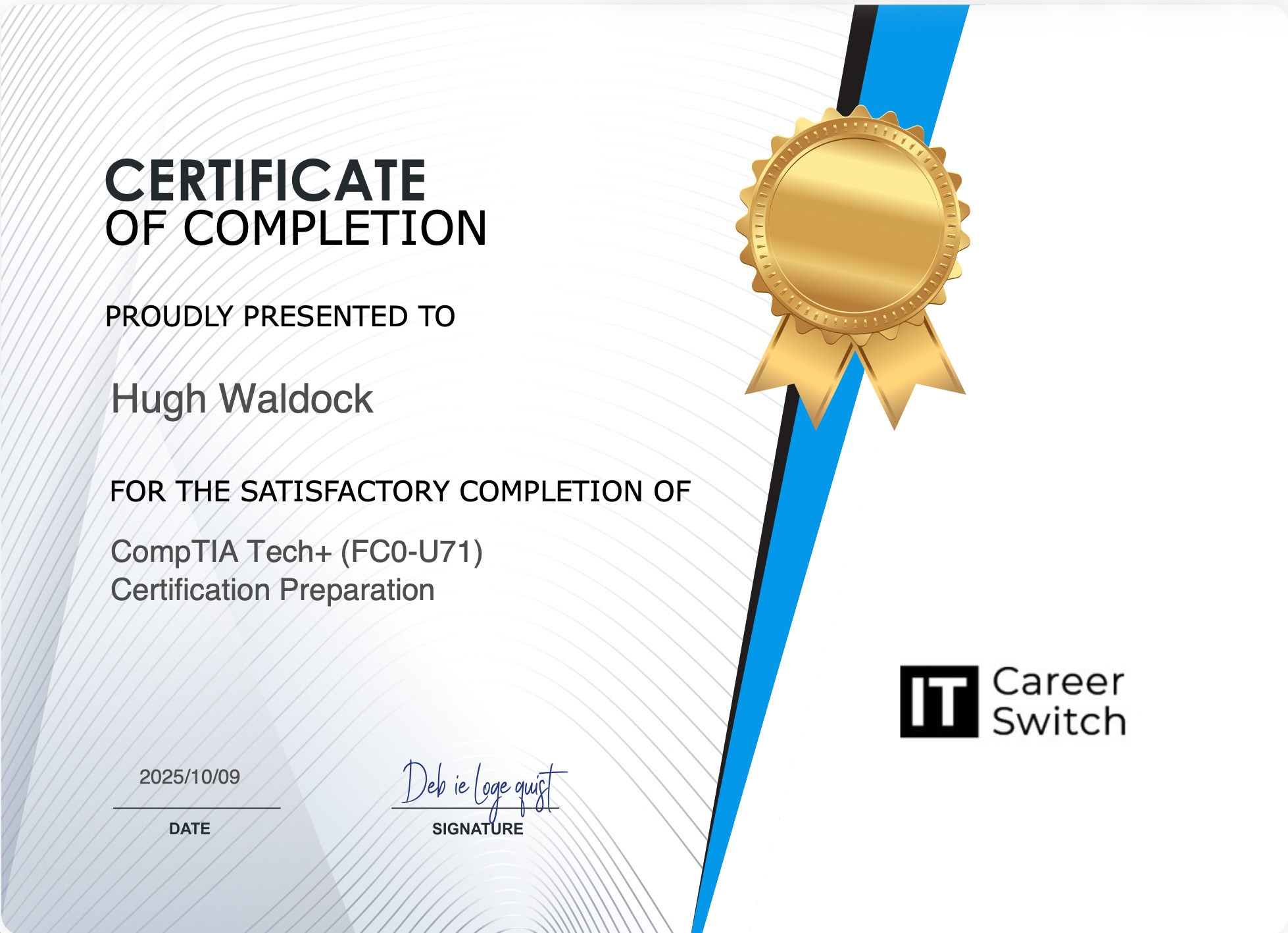
This exam covers all computing basics. Some of which are relatively simple but there is a lot that is fundamental and very useful knowledge to a budding network engineer. I've passed the internal knowledge check already with 89% but when I moved on to doing some passed papers for the external exam there weer still plenty of things to work on. Teaching consists of videos with IT Career Switch but I've purchased some mocks for myself to learn with from Pocket Prep. There are 600 questions to play with on there and some other papers on Udemy. I'm looking to complete the video course this week so I can concentrate on the past papers.
The syllabus consists of the following primary learning outcomes:
CompTIA Tech+ (FC0-U71) Exam Domains
The following are the six domains for the CompTIA Tech+ (FC0-U71) exam and their respective weight on the exam:
- IT Concepts and Terminology (13%):
- Covers the basics of computing (input, processing, output, storage).
- Includes notational systems (binary, hexadecimal, decimal, octal).
- Covers common units of measure (storage, speed, throughput).
- Explains the troubleshooting methodology.
- Infrastructure (24%):
- Focuses on setting up and managing IT infrastructure, including hardware and networks.
- Covers computing devices (smartphones, servers, IoT devices) and internal components (CPU, RAM, storage, NIC).
- Includes storage types, peripheral device setup (printers, scanners), and device interfaces (USB, HDMI, Ethernet).
- Covers virtualization and cloud concepts (IaaS, SaaS, PaaS).
- Explores networking basics (LAN/WAN, IP/MAC addresses, routers, switches) and wireless networks.
- Applications and Software (18%):
- Covers operating systems (mobile, desktop, server, embedded) and their components (file systems, interfaces, utilities).
- Explains different types of software (productivity, collaboration, web browsers) and their proper use.
- Covers web browser features, and common uses of Artificial Intelligence (AI) like chatbots.
- Software Development Concepts (13%):
- Introduces programming languages (interpreted, compiled, scripting) and basic data types.
- Covers fundamental programming concepts (variables, functions, objects).
- Explains organizational techniques like pseudocode and flowcharts.
- Data and Database Fundamentals (13%):
- Explains the value of data and information in a business context.
- Covers basic database concepts, structures (flat file vs. database), and purposes.
- Includes data storage, persistence, and availability.
- Security (19%):
- Covers basic cybersecurity measures and best practices.
- Explains security concepts like confidentiality, integrity, and availability.
- Focuses on methods to secure devices (anti-malware, firewall, patching) and authentication concepts (single-factor, multi-factor).
- Discusses encryption, password management, and security awareness.
This certification is designed to provide a broad foundation of tech literacy for those new to IT or those in tech-adjacent roles.
Pocket Prep and udemy Mocks
Pocket Prep give you a breakdown of where your strengths and weaknesses on the syllabus lie. They guarantee a pass if you get you average up to 80%. At the moment early on in the drilling of the information it's a creditable 63% overall. You can see the main weaknesses are in programming and databases that I haven't covered yet. I'm hoping to sit this by the end of in my favourite test centre in Little Braxted near Witham and pass.
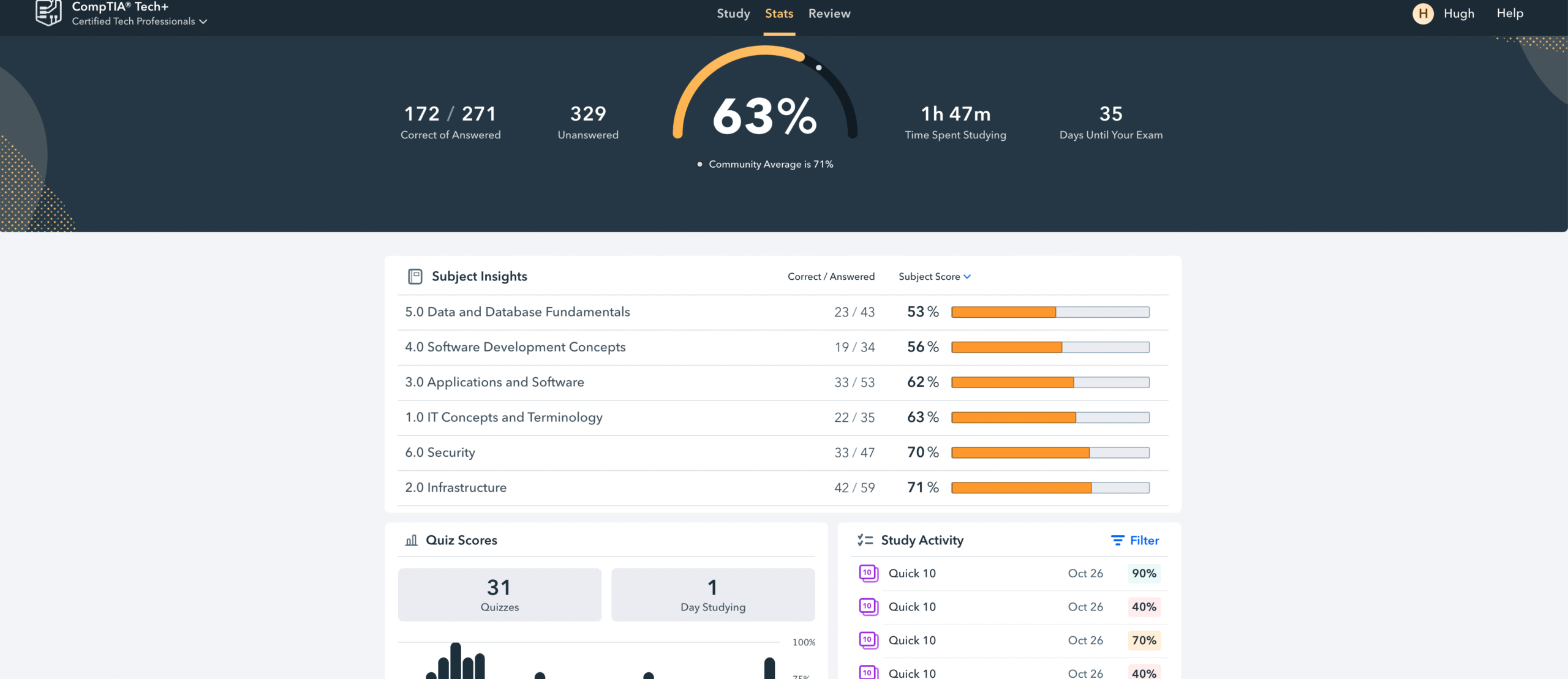
Last Minute Prep On Measure Up
I booked the first external exam of this scheme for the 25th of November 2025 at my usual test centre in Little Braxted near Witham Essex UK at 13:30. About a day before the exams I'd gone through all the pocket prep questions and got them up to an 86% average. I then went to a different company and got some more realistic mocks, firstly from Udemy and then from this measure up. You can have access to all their sets of mock exams for a £19.20 a month flat fee.
On the evening before the exam early in the night on the day of the exam even. I achieved an additional credly badge for my efforts to prepare of getting over 90% on two consecutive mock papers 91% and 94% respectively. The hardest part in prepareing for this exam was the virgin territory in the basic database and coding commands, once I'd mastered that the rest just seemed to fall into place quite well. Here is my prep badge.
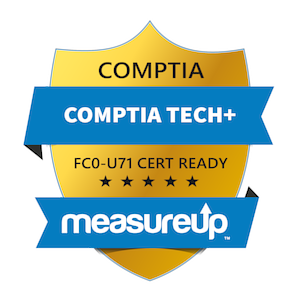
The exam Itself
I got to the exam a little early at one and was in the hall by 13:15. It wasn't any problem this time the pass mark was 72% or 650/900 it's not that high a bar for a fundamentals exam that covered a few computing basics I hadn't done before to fill in a few gaps. This is the result itself and marks. On the virgin exam I scored 718/900 which is just a fraction short of 80% 79.977% to be precise so when round fractions up...
CompTIA Tech+ Certification Exam Score Report FC0-U71
And here is my first Badge For this...

Internal exams...
Having completed tech plus the next phase of the project was to pass the two internal exams for the certifications I already have namely Network Plus N10-009 and Az900 Microsoft Azure Fundamentals. Whilst I got a creditable 89% for the Tech plus internal test the other two passes weren't that far behind at 84% for Azure Fundamentals and 83% for Network Plus respectively. With my exemptions that makes me half way through the course now with 9 months to go to achieve me CCNAs. The internal passmark is 80%.

So here are the other two internal module completion certificates....
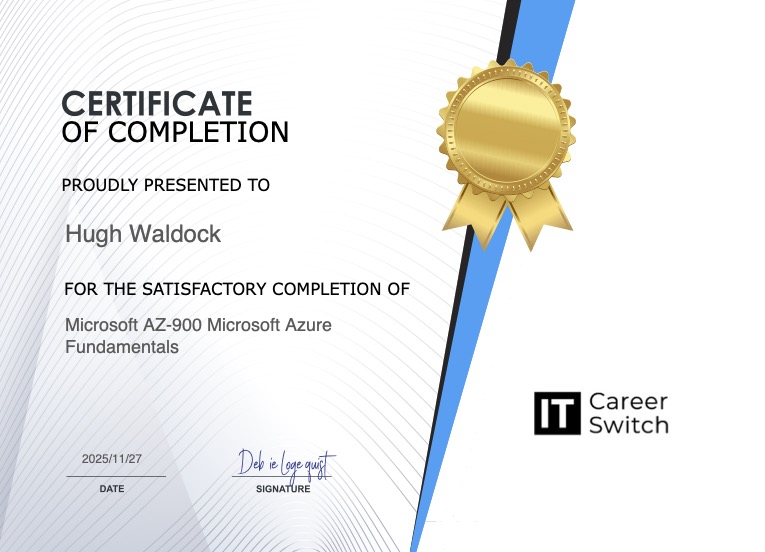
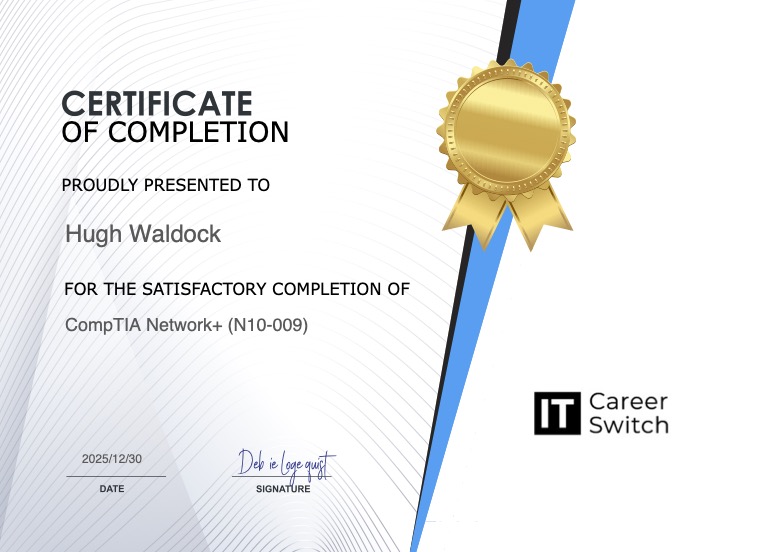
Next up
I've decided to not do each of the next three units in turn moreover to study all three units for A+, Sec+ and Cisco CCNA simultaneously CCNA stands for Cisco Certified Networking Associate. That's the one exam I'm doing with Career Switch in which the external exam voucher is included in the training price.